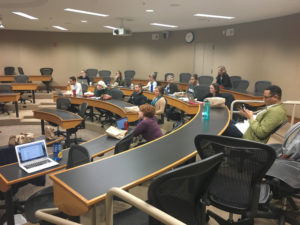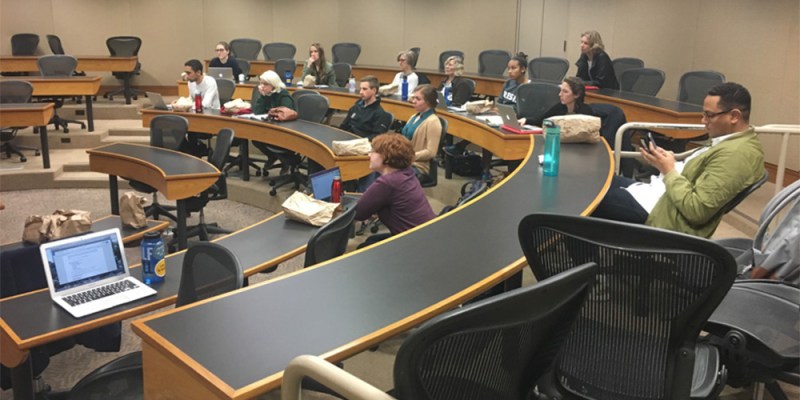The launch of a new campus group called Indivisible Stanford marks another outlet for students to act against the Trump administration — this time stemming from the law student community, which some say has become more politically active in recent weeks.
Meghan Koushik J.D. ’19 and Rachel Green J.D. ’19 founded the group in mid-January using the “Indivisible Guide,” an online document released by former congressional staffers that outlines how to use Tea Party tactics to champion progressive causes.

Indivisible Stanford’s plans include meeting with U.S. Congresswoman Anna Eshoo and becoming involved with Swing Left, an organization dedicated to swinging seats in competitive congressional districts from red to blue. The group also hopes to partner with other local organizations.
“We’re really hoping to use this group as the platform for people like me who are waking up to how important it is to be civically engaged and to expand their involvement beyond just going to the ballot box every four years,” Koushik said.
Indivisible Stanford’s presence is mostly online, with over 400 members active on its Facebook group. Co-founders update the page with daily actions, such as calling representatives, and events, such as town halls with politicians. According to the Facebook group, Indivisible Stanford also seeks to be a resource for Stanford Law School (SLS) students “who may be organizing similar groups in red states/areas back home to debrief and support each other.”
According to Devon Grey J.D. ’19, law students in particular may be inclined toward Indivisible’s form of political activism given not only their sense of duty to act against harmful policies of the new administration, but also their natural interest in law and public policy.
The Indivisible mentality is defensive and explicitly anti-Trump; its online resource is labeled as a “practical guide for resisting the Trump agenda.” However, Stanford’s chapter will focus not only on defensive strategies but also on advocating for progressive causes that are more locally focused, such as housing, homelessness and educational inequality.
“Because of our location in California, we’re trying really hard to … harness Stanford’s resources,” Koushik said.
Indivisible Stanford is open for membership to all who consider themselves constituents of California’s 18th District, which includes both Palo Alto and Stanford. This means that Stanford undergraduates, graduate students and members of the extended community can join.
Indivisible Stanford is not the only group at SLS that focuses on community-building and responding to government policies. The organization’s efforts are joined by those of groups such as National Lawyers Guild (NLG) and Stanford Advocates for Immigrants’ Rights (SAIR).
Stanford’s chapter of NLG is led by three law students: Yvette Borja J.D. ’18, John Bonacorsi J.D. ’18 and Drew Flood J.D. ’18. According to Borja, the organization holds “legal observer” trainings to teach people how to look out for and record police misconduct during protests and direct actions — specifically, police infringement on the first and fourth amendment rights of protesters. The trainings, which have occurred twice this academic year, are open to anyone in the community.
Members of Stanford NLG legal-observed during a direct action outside of Wells Fargo on Inauguration Day and also recently held a workshop about abolishing police forces.
“One of my goals is to try and get the law school more engaged and to provide opportunities for law students to get more involved with folks in the community, community organizers [and] activists,” Bonacorsi said.
Both Borja and Bonacorsi highlighted the importance of vocabulary when it comes to discussing activism at Stanford. Asked whether the 2016 presidential election has resulted in a burst of “activism” at the law school, both students noted that the definition of activism itself is difficult to articulate.
However, Borja and Bonacorsi said the law school has become more involved with immigration rights in the wake of the election, particularly through the efforts of groups such as SSN and SAIR.
Several SLS students felt a call to action of sorts in the aftermath of the election. Grey joined Indivisible out of an impulse to do something constructive.
“I think that’s a common sentiment for most of the group,” he said. “There was a common understanding that there’s a lot of work to do in protecting our values and that any effort had to start with us, first and foremost.”
Contact Jordan Payne at jpayne1 ‘at’ stanford.edu.
Correction: An earlier version of this article mistakenly spelled Bonacorsi’s name as “Bonacosi.” The Daily regrets these errors.
